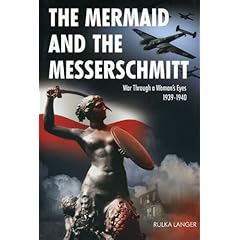
I've been looking forward to this memoir by Rulka Langer for a very long time. It's the first publication of Aquila Polonica, a new press started by Terry Tegnazian and Stefan Mucha dedicated to publishing works about the Polish World War II experience in English. The press hopes to publish firsthand accounts, memoirs, poetry, literature, photographs, artwork and historical studies. Terry Tegnazian has written that what inspires her is Poland's role in World War II. It is, she says, "possibly the most heroic and tragic of all the Allies, yet remains one of the least-known aspects of WWII to those living in the West. It is our mission to bring this amazing story to the wider English-speaking world."
Aquila Polonica's The Mermaid and the Messerschmitt: War Through a Woman’s Eyes, 1939-1940 is a rare eyewitness account of the first six months of WWII – the Nazi German invasion of Poland, the Siege of Warsaw, and the first months of the Nazi occupation – written by Rulka Langer, a civilian, a young Polish career woman and mother, who was a graduate of Vassar College in the U.S.
Her story is enhanced by the historic photographs, documents, and maps that the publishers have gathered together especially for this volume.
The book has been chosen as a selection of the Book-of-the-Month Club, the History Book Club, and the Military Book Club, and is endorsed by Dr. Zbigniew Brzezinski. Publishers Weekly calls it “an unusual take on WWII.”
The recently retired head of the Los Angeles Public Library system read it and says: “I couldn’t put the book down. Her story is riveting … utterly contemporary and compelling.”
The Mermaid is available in hardcover at your local bookstore (if it’s not in stock, they can order it for you), or online at Amazon.com.
4 comments:
Hey John,
Thanks for posting this. I'm amazed by the focus and quality of AP's work, website, etc. As a long-time student of recent Polish history, and a poet & writer of Polish descent, I have long believed the stories of the Polish experience during WWII were largely untold. Having been to Poland many times and visited several significant sites more than once, I've noticed three elements that have contributed to this: 1) The overshadowing of the Holocaust history as it pertains to Europe's Jews; 2) A reluctance (often due to lack of resources, discomfort with "telling," or a perceived culpability for wartime activities) on the part of Poles to tell their own stories from the war; and 3) the immediate catapulting of Poland into the dark side of Soviet influence. These elements are inter-related, I think, and have delayed the telling of the Polish experience until just recently. So much Polish history from the war period has already been lost, which makes your work and that of Stefan and Terry so very important. -- Jeremy Edward Shiok
Thanks for your comment, Jeremy. It is amazing that the story of Poland isn't better known, and I think that the reasons you give do explain in part why that may be.
I think also that a possible explanation may be that Poland represents a failure on the part of America and its Allies.
Poles gave so much to the Allied cause in blood and suffering, and then they were abandoned by the Allies to the Soviet Union.
It was shameful, and people and nations don't want to recall their shame.
John,
I'm so glad that the Polish story is being told. And, I am very glad to have found your blog. I am of Polish descent and have always wondered why their role isn't known more. But just last week I discovered through my genealogical research that my great-grandfather's cousin was a Polish Catholic artist in the Polish resistance who died at Auschwitz. I am eagerly searching for more info about him and that whole period so I can tell his story.
Thanks again,
Donna
Hi, Donna, thanks for the post. I would be interested in hearing more about your relative who died in Auschwitz as you find out about him.
You may be interested in reading the story of Thaddeus Borowski, a Pole who served there. His book is called This Way to the Gas, Ladies and Gentlemen.
It is one of the great books about Auschwitz.
I also recommend the web site on Poland in WWII that is tied to Aquila Polonica:
www.polandWWII.com
Post a Comment